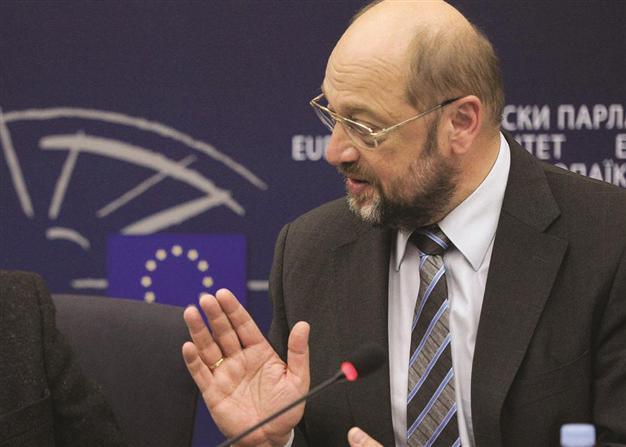New EU chapters to give pace to Turkish reforms
BRUSSELS / ANKARA - Hürriyet Daily News

EU Parliament President Martin Schulz
attend a press conference at the European
Parliament in Strasbourg. AFP photo
The European Parliament’s General Assembly adopted a 2012 progress report on Turkey yesterday, providing a potential catalyst for the opening of new accession chapters for Turkey after years of deadlock between Ankara and Brussels.
Members of the European Parliament (MEP) called for the opening of negotiations on the judiciary, fundamental rights and home affairs, while also praising recent talks that could help settle the Kurdish issue.
Ankara praised the European Parliament’s approval of the report. “[The Parliament] has seen that the report includes very important political reforms taken by the government and understood that the report, in general, confirms and applauds the determination of the government,” EU Minister Egemen Bağış said yesterday, but criticized the decision to criticize Turkey for not interacting with Greek Cyprus during its EU term presidency.
“It is injustice to bring our righteous attitude during the Greek Cyprus’ rotating presidency up as a subject of criticism and ignore the sovereignty of Turkish Cypriots,” Turkey’s statement said.
“We need a commitment from both the EU and Turkey,” said Ria Oomen-Ruijten, the Parliament’s Turkey rapporteur.
“Turkey needs to step up efforts to guarantee freedom of expression, media freedom and all other fundamental freedoms in line with the values of the EU. The EU must do its utmost to support Turkey in the reform process; renewed efforts for the opening of further negotiation chapters are important.”
The report was approved by 451 votes in favor versus 75 votes against. Prior to the vote, European lawmakers rejected a proposed amendment to the wording of draft that would leave out a definition of the outlawed Kurdistan Workers’ Party (PKK) as a “terrorist organization.”
In its report, released Oct. 10, 2012, the EU expressed serious concerns about Turkey’s progress in meeting the political criteria for full membership in the bloc, paying significant attention to freedom of expression, assembly and association, lengthy prosecution and detention periods and the failure to find a political solution to the Kurdish issue.
‘Open chapters’ In particular, MEPs called on the European Council to open negotiations on the judiciary and fundamental rights (Chapter 23) and justice, freedom and security (Chapter 24) to accelerate the reform process, while stressing the reform of Turkey’s judiciary as central to its democratic consolidation and modernization.
The Parliament welcomed the adoption of Turkey’s third and fourth judicial reform packages but insisted on fully narrowing the broad definition of criminal offences, namely of the act of terrorism, shortening excessively long pre-trial detention periods and curbing the role of special courts.
MEPs also hailed Turkey’s efforts to fight “honor killings,” domestic violence and the existence of forced marriages and child brides but expressed concern that violence against women was still prevalent. They also called for the active promotion of women’s rights, education and participation in the labor market and in politics.
The Parliament further welcomed direct political dialogue between the government and the jailed leader of the PKK, Abdullah Öcalan, saying this could open the perspective of a historic agreement that would settle the Kurdish issue peacefully and democratically.
Turkey, in turn, welcomed the mentioning of its progress with recent laws, the statement said, while also praising the mentioning of the peace process and Turkey’s humanitarian effort for Syrian refugees.
On Cyprus, MEPs said they regretted that Turkey had “missed an important opportunity to start a process of engagement and normalization of relations with Cyprus” during the Greek Cypriot Presidency of the council. Greek Cyprus was the EU term president from July 1, 2012, until the end of the year.
Addressing the issue of Syria, the legislature praised Turkey for its humanitarian assistance to the increasing number of Syrian refugees but insisted that the EU and Turkey should also develop a joint strategic vision to the Arab republic’s crisis.
Turkey has provided humanitarian aid totaling $650 million in the last two years to the 300,000 Syrian refugees it hosts on its territory, according to figures.
MEPs also said Turkey should pursue foreign policy directions in greater concert with the EU than it did so in 2012. The Parliament, meanwhile, rejected a separate proposed amendment that would have given Turkish Cyprus observer status at the body. The issue, however, will be subsequently discussed at the presidency council.
